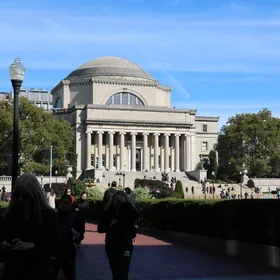As the demand for evidence-based political strategies—whether for elections, policy proposals, or for political movements—continues to grow, so has the need for trained political analysts. Whether it be for highly contested electoral races with high-stakes outcomes, or for more focused issue-driven initiatives, the hunger for sophisticated data analysis requires next-level professionals for next-level outcomes to win hearts, minds, and financial backing. In addition to analytic techniques, political professionals also need a substantive understanding of practical politics and strategy.
While many programs prepare students in either strategy or quantitative analytics, very few academic programs prepare individuals to excel in both. To meet that need, the Columbia University School of Professional Studies (SPS) and the Columbia University Department of Political Science have developed the Master of Science in Political Analytics program to train a new generation of professional political analysts, consultants, and managers who are uniquely equipped in the substance of politics and quantitative methods to understand and communicate effectively with other professionals and laypeople about political behavior and dynamics. The Master of Science in Political Analytics is now accepting applications this fall for its inaugural class to convene in fall 2023.
“Political analysts have traditionally come from political science, law, or quantitative backgrounds. This degree integrates them all. While analytics and data-driven decision-making are playing an ever larger role in modern politics, there are very few academic programs that prepare individuals to excel at these tasks,” said Political Science Professor Greg Wawro, the program’s founder and leader. “One of the key goals of this program is to narrow the gap between substantive political professionals and those involved on the technical analytic side. The program teaches analytics in an explicitly political context, facilitating crosswalk with nontechnical professionals and decision-makers.”
The program is designed to fill an important role in the rapidly developing field of data analytics as it is applied to politics and public policy. Drawing upon the University’s academic strength in the quantitative social sciences—particularly in political science and public policy, statistics, mathematical modeling, and applied analytics—and uses a scholar-practitioner model combined with a core academic curriculum to provide students the opportunity to build their understanding of theory and research while they acquire hands-on experience and apply their learning in a professional setting. “The Columbia University School of Professional Studies continues to be a hub for pedagogical innovation that anticipates market demand to empower industries and professionals,” said Troy J. Eggers, dean of the School of Professional Studies. “American electoral and issue promotion campaigns are at a critical turning point. There is a need for political strategists who understand data, theory, and political context and are able to enshrine ethical practices that are consistent with democratic values and help to protect the integrity of U.S. elections,” said Eggers.
This program allows for students interested in new approaches to data analytics, such as machine learning, to integrate those interests with a politics or policy focus. Furthermore, it will provide a clearer professional trajectory into the discipline, by helping students acquire necessary skills and suitable employment after graduation. The program draws from the renowned faculty in Columbia’s Department of Political Science; SPS; the School of International and Public Affairs; and the Quantitative Methods in the Social Sciences program.
This nonpartisan program is designed for students from diverse political and professional backgrounds. The program’s curriculum requires that students complete thirty-six credits, which include a set of core courses, selective courses, and a capstone, that all build toward a comprehensive understanding of the foundational, theoretical, analytical, and applied skills needed for professional data-oriented careers in politics. Required courses are largely in person, but a number of core courses will be offered online. The degree will be offered both full-time and part-time, to enable flexibility for working professionals to enroll. The full-time option enables completion of study within one calendar year, and full-time students are able to complete the degree in three semesters. Part-time students are able to complete the degree requirements in six semesters. Post-graduation career pathways may include—but are not limited to—campaign management, consulting, lobbying, public and governmental affairs, policy analysis, political fundraising, and media.
Admitted students will enjoy access to Columbia University’s robust offering of courses, faculty, guest speakers, events, resources, and employment networks. Resources include more than seventy professional associations and student organizations; skills-based workshops; drop-in spaces across Columbia’s expansive campus locations; networking receptions; exclusive career training and job listings through the SPS Career Design Lab; and a vibrant calendar of co-curricular and social activities hosted by the SPS Office of Student Life. The program also offers students the unique geographical advantage of being located in New York City, a global capital for politics, business, media, and advertising.
The application for admission is now open.
Learn more about the new Columbia University M.S. in Political Analytics program.
Please join us at the launch event for Columbia’s new Master of Science in Political Analytics, which features a discussion of “Analytics and the 2022 Midterm Elections: Strategy, Prediction, and Explanation,” on October 24 at 6:30 p.m. in Low Library, cohosted by the Department of Political Science and SPS. The panel discussion features faculty members Professor Wawro; Burgess Professor of Political Science Donald P. Green; Wallace S. Sayre Professor of Government and Professor of International and Public Affairs Robert Y. Shapiro; as well as Shailagh Murray, Executive Vice President for Public Affairs at Columbia University; Aaron Strauss, program director at OpenLabs; and Doug Usher, partner at Forbes Tate Partners. The panel will be followed by a reception celebrating the launch of the new program. RSVP.


